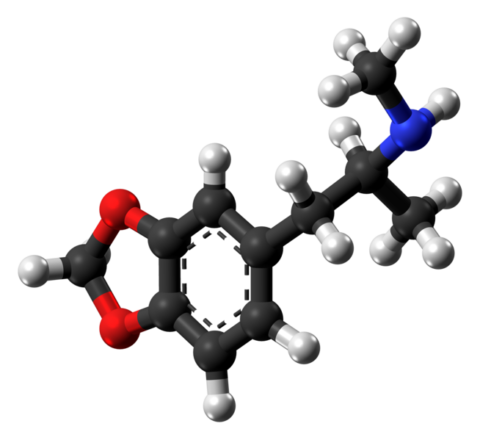Colby Cosh indulges in a minor “I told you so” after the FDA’s expert panel recommended against the agency permitting any medical use of MDMA, despite some experiments indicating it does have therapeutic value:

Ball-and-stick model of the 3,4-methylenedioxy-methamphetamine molecule, also known as MDMA, or ecstasy, a well-known psychoactive drug. Based on the crystal structure of MDMA hydrochloride, as determined by X-ray diffraction.
Color code: Carbon, C: black, Hydrogen, H: white, Oxygen, O: red, Nitrogen, N: blue.
Image by Jynto via Wikimedia Commons.
Hopes for research into therapeutic uses of psychedelic drugs received a setback last week, one that your correspondent saw tripping (geddit?) up the road in advance. An expert panel published its official advice to the United States Food and Drug Administration (FDA) on permitting medical use of MDMA, the synthetic nightclub enhancer that we’re afraid the kids probably still aren’t calling “ecstasy” or “molly”.
There is long-recognized potential for MDMA to be combined with classical psychotherapy in treating emotional disorders, notably post-traumatic stress (PTSD), and now there are some small, limited studies showing evidence of positive effects.
But the FDA’s scientists weren’t very impressed with this evidence, and they voted almost unanimously against creating a therapeutic exception to the illegality of ecstasy, which the U.S. Controlled Substances Act classifies as a “Schedule 1” drug, right next to heroin. The panel’s advice isn’t binding on the agency, which is crawling in somewhat good faith toward recognizing the understudied medical potential of psychedelics. But the vote emphasizes the inherent problems that drugs face, once they are defined in law as “recreational”, in winning over skeptical scientists.
Reason magazine’s great drug-war correspondent Jacob Sullum has a thorough discussion of the issues. The existing research, despite some impressive headline results, has garden-variety issues with dropout rates, follow-ups and occasional researcher shenanigans. But the big problem, which defies easy technical solution, is with scientific blinding of the research subjects.
Scientific trials of the modern kind are predicated upon separating illusory placebo effects from genuine treatment effects. Researchers expect that a high-quality study will have a control group that receives sham treatment or none at all, and good practice requires that experimenters and their guinea pigs are both blind to who is in what group.
News flash: most people can tell whether they’ve been really given a psychedelic drug. Indeed, most doctors can tell whether they’ve given a patient a genuine psychedelic drug, and how much of it. Many placebo-controlled trials on psychoactive drugs, perhaps most of them, thus suffer from an alleged problem of broken blinding. (Have a glance, for example, at Table 2 in this review of blinding procedures in psychedelic studies.)



